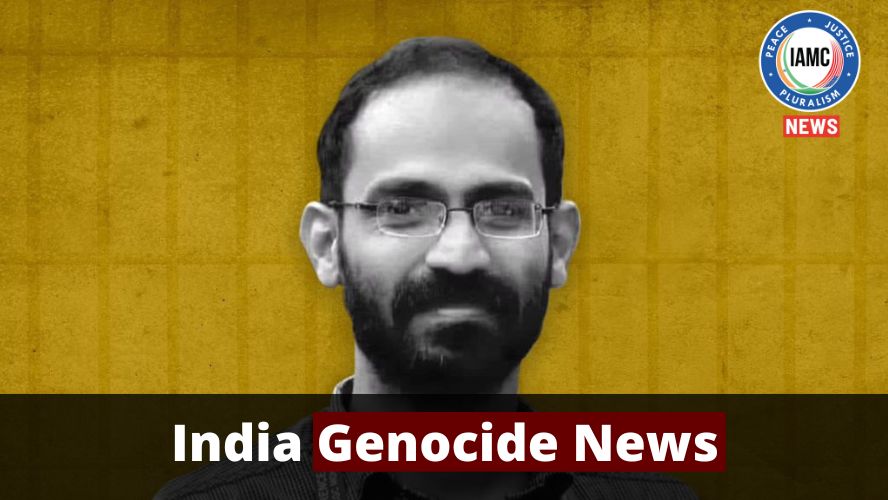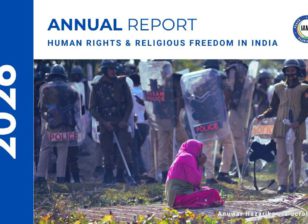Jailed for two years without any crime, journalist Siddique Kappan moves SC for bail
Kerala’s Muslim journalist Siddique Kappan, who was arrested in Uttar Pradesh in October 2020 while on his way to Hathras city to report on the rape and brutal murder of a Dalit woman, has approached the Supreme Court seeking bail.
The Lucknow bench of the Allahabad High Court had earlier this month rejected the bail application of Kappan, who has been booked under the draconian Unlawful Activities (Prevention) Act. Chief Justice N. V. Ramana listed the hearing for August 26.
“Presently, the petitioner has spent almost two years behind bars on the basis of trumped up charges only because he sought to discharge his professional duty of reporting on the infamous case of the Hathras rape/ murder,” his petition said.
“[T]he present petition raises seminal questions pertaining to the right to liberty, as well as the freedom of expression and speech vested in independent media under the aegis of the Constitution,” the plea said. The high court has failed to take note of the fact that neither the police’s First Information Report (FIR) nor the charge sheet makes out a case under sections 17 and 18 of UAPA about raising funds for a terrorist act and conspiracy.
“The conclusion of the high court to the effect that the petitioner had no work in Hathras is unfounded and baseless and reflects a total non-application of mind. The high court has glossed over the fact that the petitioner, in the discharge of his duties, has travelled extensively over the country for the purpose of reportage,” the plea claimed.
Jamia Millia University threatens to cancel the admission of MPhil Scholar Safoora Zargar
Student activist and research scholar Safoora Zargar has said that the Department of Sociology in Jamia Millia Islamia, the prestigious University in New Delhi, was threatening to cancel her MPhil admission in a “discriminatory” move.
The 29-year-old Muslim activist claims that her application for an extension of Mphil thesis submission has been put on hold for over eight months.
“As if now I don’t know the status of my admission and nothing has been communicated to me,” Zargar told Maktoob.
Responding to the allegations, Dr Manisha Tripathy Pandey, Professor and Head of the Sociology department, said all the due procedures were taken.
Zargar’s MPhil, which she began in February 2019, looks into “socio-spatial segregation among Muslims in Delhi. A case study of Ghaffar Manzil Colony.” She works under associate professor Kulwinder Kaur and completed three years in February 2022, with one COVID extension and a normal extension available for all scholars.
In December 2021, Zargar submitted an application for a COVID extension, in which the department only granted two months — till February 2022. When the department verbally declined to forward her application for a full six-month extension, as per the University Grants Commission notification, she wrote to the registrar, which she believes bothered her supervisor.
In May 2022, UGC declared that universities and higher educational institutions can give another extension of up to six months beyond 30 June for MPhil or PhD thesis submission on a case-to-case basis after reviewing a student’s work. This was the fifth COVID extension granted to research scholars.
Whistleblower says Indian government forced Twitter to hire its agents
Former head of security for Twitter, Peiter Zatko, has alleged that the Indian government forced the social media site to hire agents to access vast amounts of sensitive data at a time of intense protests in the country.
Zatko’s allegations regarding the state of Twitter’s operations in India were a part of a wider whistleblower report against the microblogging site. Twitter has denied Zatko’s allegations and described them as a false narrative.
Zatko was fired by Twitter CEO Parag Agrawal after he began documenting what he said were repeated security violations, and as he worked with the company’s compliance officer on a formal investigation based on his claims.
He alleged that Twitter executives hired two people whom he believes were Indian government agents and put them in positions with “direct unsupervised access” to internal Twitter data and information.
The Indian government is yet to respond to the allegations raised by the report.
“Twitter and the Government of India must release public statements and address these concerning allegations that Twitter hired an agent at the behest of the Indian government and gave the person unfiltered access to user data,” tweeted Apar Gupta, Executive Director of the Internet Freedom Foundation (IFF).
Zatko also says Twitter is beset by fundamental architectural flaws that allow too many employees “God mode” access to its systems, making the platform vulnerable to hackers and influence by foreign intelligence agencies, reports TIME.




